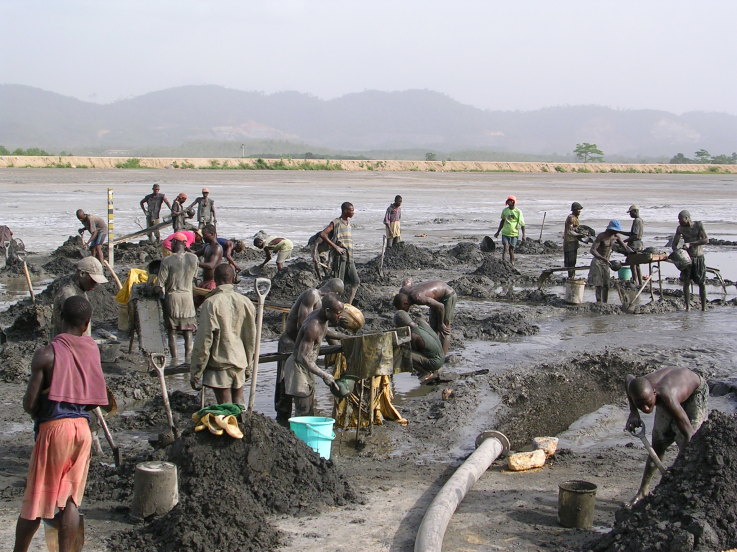Defending community rights in Ghana: 3 Lessons for us all
An interview with Augustine Niber, Executive Director of the Centre for Public Interest Law in Accra, Ghana.
Noémie Hailu is a former Extractive Industries Campaign Coordinator at Oxfam America.
“You cannot link the extraction of minerals and community development—not at all,” says Augustine Niber.

Earlier this month, Oxfam America’s Extractive Industries campaign had the privilege of hosting Niber in Washington, DC to participate in a series of events, including an Oxfam-sponsored panel on land, natural resources, and food justice during Ecumenical Advocacy Days and the launch of an Oxfam report measuring the effectiveness of National Human Rights Institutions that features a case study in Ghana. Here in the Oxfam offices in DC, amidst all his other activities, I had the opportunity to sit down with Augustine Niber and learn more about him, his work, and the issues communities affected by mining face in Ghana.
Founded in 1999, CEPIL is a non-profit public interest and human rights NGO and one of CEPIL’s key initiatives, the Mining Communities Human Rights and Legal Support Program, has provided free legal services, including court room representation, to communities negatively impacted by mining companies in Ghana. CEPIL also provides legal literacy training and human rights education to these communities to enable them to demand their rights.
“For state institutions in Ghana, the driving force has always been to promote mining activity,” says Niber, “but that type of development paradigm has not succeeded.”
So what does bring about development for communities affected by mining?
Below are three lessons I took away from hearing more about Augustine’s experience as a lawyer and an advocate, pertinent even beyond the mining sector:
1. Good governance and transparency are key.
Ghana is often referred to as the beacon of democracy in Africa. Niber shared that this has fostered a shift in the space for debate on extractive issues, and the role of civil society in this debate.
“The democratic environment we have enjoyed for twenty years now is a factor. Before, if you spoke about mining, you were seen as anti-development. Government has come to realize that civil society organizations working on extractive industries issues are not anti-development or mining, but development partners.”
Civil society participation and pressure have played an important role in pushing forward legislation promoting transparency of extractive resources revenues, particularly regarding oil extraction, which is relatively new to Ghana.
“As civil society organizations, we are working to ensure that the nature of violations for community rights in solid mineral extraction do not happen in oil extraction. Oil revenues should not be misused the way mining revenues have been used.”
Indeed, Ghanaian civil society was deeply involved in moving the passage of the Petroleum Revenue Bill in 2011, requiring petroleum revenue receipts and expenditures to be made public. The bill also called for the creation of a Public Interest and Accountability Committee to independently monitor and regulate the sector.
But Niber cautions that transparency is only the first step to accountability.
“Transparency is an important policy initiative, but it is not just about the policies in Ghana. It is about implementation of the policies.”
2. Community consultation and consent are key.
“Communities are not benefiting [from the industry]. [They] are not part of the decision making process. There have been human rights violations where community members have lost farmland.”

The extraction of natural resources can only contribute to development if a community’s fundamental rights are respected, Niber explained. The lack of consultation and consent often leads to the displacement of communities without just compensation. Niber also explained that some community members take part in “galamsey”, or artisanal mining, which can be a very dangerous undertaking.
“These community members are often harassed by state and private security employed by mining companies. Communities become disgruntled and protest. Some people have gotten shot.”
In addition, mining companies often fall short in their promise of jobs for the communities in which they operate. This can also create tension and unrest between the communities and the extractive companies. This is why Niber says companies and governments should be required to obtain the Free, Prior and Informed Consent (FPIC) of communities affected by oil and mining activity.
3. Taking the long view is key.
Achieving true, long-term social justice cannot be done overnight, something Niber knows all too well. Providing legal assistance and court representation for individuals and communities negatively affected by mining is a lengthy process, and a case can easily last a few years before a decision is reached.
“There are delays. Companies and their lawyers know how to frustrate the cases through the legal process and court system. It is possible to cause litigation fatigue with vulnerable communities.”
Though attaining results can take a long time, the payoff can be great and well worth the effort and wait. Such is the case with Niber’s most memorable case at CEPIL. “It was against the [Ghanaian] Environmental Protection Agency (EPA) and a defunct company that operated and left. The Minerals Commission, [responsible for the regulation and management of the mineral resources of Ghana], and the government were held jointly responsible for the destruction that took place.”
The effects of this case went well beyond mining. “CEPIL instituted the case in our name and the court ruled in our favor. The case has become a precedent that other civil society organizations are now using, and it has expanded the frontier of jurisprudence of Ghanaian courts.”
(Bonus lesson!) 4. Bringing global pressure is key.
Niber said that global pressure is important to his work, and encouraged us that here in the US, we can play a part. We can push our policy makers in DC to encourage African governments to agree to a common mining code in ECOWAS, push to protect the 1504 transparency provision, and pressure API to drop the lawsuit against it.
Oxfam has been supporting CEPIL since 2006. To learn more about their work, see: www.cepil.org.gh